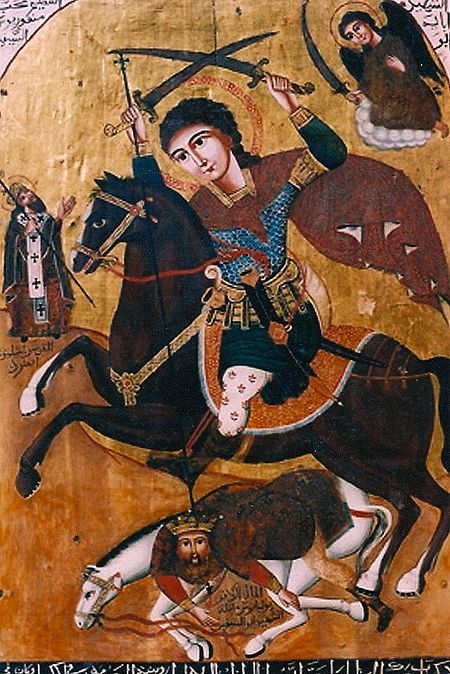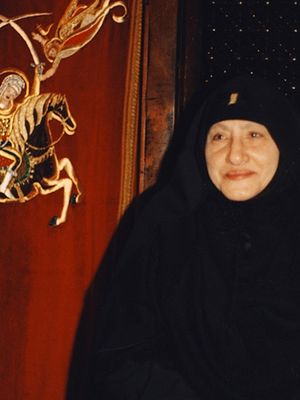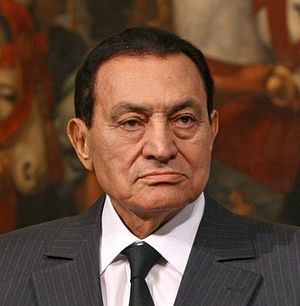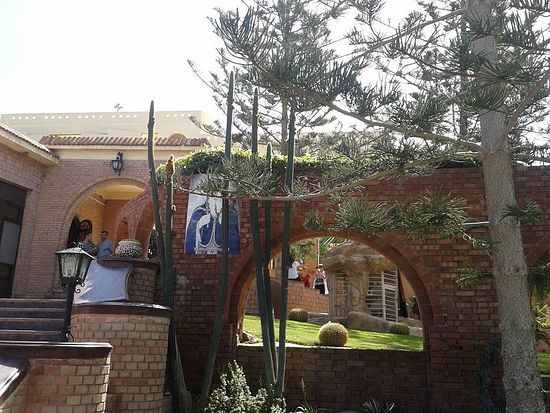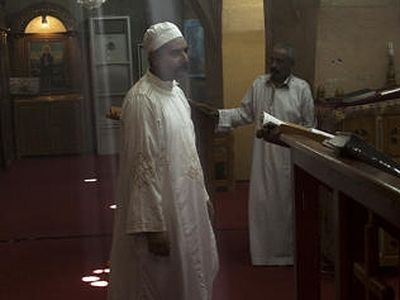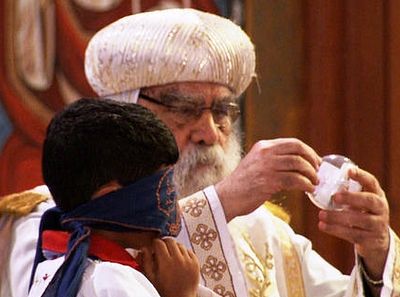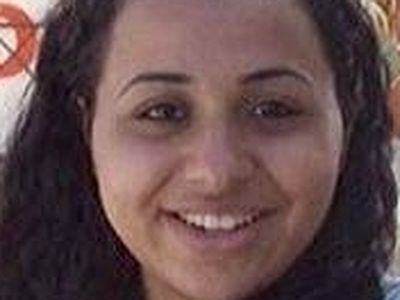Last Sunday, December 7 according to the new calendar, we celebrated the memory of Great Martyr Catherine. On that day is celebrated yet another great saint who is especially honored in the Christian East—Great Martyr Mercurius of Ceasarea. We are reproducing here the narration of Archpriest Pavel Nedosekin about a relatively recent miracle of this saint that happened in Egypt.
I was amazed by the Copts: they have a very living religious feeling. For several centuries now they have lived surrounded by enemies. There have even been periods when they were killed only for knowing the Coptic language. As a result, practically no one speaks it anymore; however, their faith continues. They speak Arabic; they are a minority in a country that sees them as an enemy, but they bear the ascetic labor of their faith like confessors.
Their monasteries are filled. The monastic rule is strict. And most important, there is a constant, taut faith in miracles. In Cairo, in the monastery of the holy Great Martyr Mercurius, we were told a story that, in the words of those telling it, happened not very long before we came, but the acuteness and reality of the theme reminds one of something out of the ancient patericons.
The Monastery possesses a parcel of land on the shores of the Mediterranean Sea in the region of Alexandria. Several nuns lived there, guarding the land as a monastery metochion. It happened that the defense minister of Egypt took a liking to this parcel of land. Property belonging to the Defense Department was in fact located right near the monastery property. So he confiscated the property through the Ministry of Land Governance in order to build a vacation facility for officers. These documents were personally signed by President Mubarak.
By the time Abbes Irina (Tamav Erini—Mother Irina in Coptic) was informed of this it was too late: the land was already considered transferred to the Ministry of Defense.
In the monastery of St. Mercurius itself, in Cairo, there are over 100 nuns. The monastery occupies a whole city block, enclosed on all sides by thick walls, with only one entrance through tall gates. This is fairly typical for Eastern countries, where most of the population is not Christian. The abbess called all the sisters together and explained the situation to them. “There is no one on our side. All the powerful of this world are against us. We have only God and His faithful servant, our heavenly protector St. Mercurius. We will pray to God and to St. Mercurius that we might find justice and not lose our monastery land.”
A fast was declared in the monastery. It was recommended to all the nuns that they refrain also from unnecessary conversations and say the Jesus prayer. Thus passed several months. Rumors came from Alexandria that building machinery had already arrived and a new fence was erected around the entire perimeter.
In the center of this women’s monastery in Cairo stood a large statue of the holy Martyr Mercurius. It not an ordinary sculpture—the saint sits on a horse in full military armor, and in his hands are two sabers, raised high above his head. This sculpture was made in an usually realistic style and painted like a natural image. When you first see the sculpture you understand that the saint, sculpted along with his horse in natural proportions, is as if alive—the only thing lacking is movement.
Further I will relate the story as I heard it from various people in Cairo, nearly ten years ago.
One night, as Abbess Tamav Erini was praying in her cell, a man entered on horseback with the appearance of an ancient soldier and said, “Quickly take the land title documents and get on the horse behind me—we must go.”
In a little time the abbess found herself in a large palace. It was absolutely quiet all around, only the sound of horseshoes clapping against marble resounded from the walls. The horseman knew the road. Galloping down several corridors, he and his passenger found themselves in a spacious, quiet, and low-lit room. This was someone’s bedroom. The travellers were in a hurry. It all happened rather noisily.
“Who is there?” came a voice from the side of a large bed. The soldier rode up to the man lying there and said, “I have brought you this nun. You have taken their monastery land unfairly. You must set it aright.”
“What nun, what land?” the man said quickly as he fussily rose from his bed. “I can’t see anything, you need to turn on the light.”
The mysterious guest turned toward the abbess, who was standing by the wall. She reached for the light switch, and the room lit up with bright lamps.
Cautiously looking over the horse, the man woken from his sleep regained his composure and asked calmly, “Who are you, and how did you get in here?”
“I am Markoris Abu Seifen (Mercurius of the Two Sabers—Arabic),” answered the martyr, “and you know who this is. These people live under my protection. They have been asking me to help them for several months now. You should correct this mistake and then you will remain unharmed. Here are all the documents for my land that had been unjustly taken from these people."
The abbess thought she was sleeping. It was all so realistic that she began to be afraid, and wished she could wake up from this strange dream as soon as possible and be in her cell.
The facial features of the man who rose from his bed seemed familiar to her. She was torn between the thoughts, “Who is this?” and “How can I wake up faster?” But keeping her composure she placed all the documents on the table before the man. He looked over the matter for a few minutes and then said, “Yes, this is my signature. I allowed them to adjoin this vacant lot to the lands of the Ministry of Defense. But what can I do at this late hour?
“Write an order,” said the martyr. “Write that you cancel the former order! See, here are all the necessary numbers of documents. Write this order in duplicate. In the morning you will give orders to stop the construction work and that the land be returned to me. Give this woman the second paper with the indication that the parcel is the monastery’s property”
The man submitted. He took a clean sheet of paper, anxiously began shuffling through the documents he had been given, and started writing something with concentration.
When he finished he was very agitated. Afraid of the soldier in medieval armor, he said to the abbess:
“Come here, please. Here are your papers. Everything will be in order for you. Do not worry about this any more. All the best to you.
By saying this he apparently wanted to hasten the end of this strange visit.
By the soldier’s powerful hand the abbess found herself seated again on the horse behind him. The riders headed for the door. There was a pause. At that time, the man standing by the table, as if wishing to say goodbye politely, turned to the soldier with a strange phrase:
“I know you, you are Abu Seifen. Tomorrow I will come and thank you.”
Already by the door, half turned to the master of the bedroom, the martyr pronounced, “Do not take revenge on anyone!”
Then there were the streets of Cairo, the corridors of the monastery, and the quiet of the night. The Abbess came to herself standing in the center of her cell. She was holding papers in her hand. The thought crossed her mind that she might have become somnambulistic. But her soul was exultant, and her consciousness told her that something unbelievable, something very important had happened.
She called her cell attendant, who customarily slept near the entrance of the abbess’s chambers. By her sleepy appearance it could be seen that her sleep had not been disturbed, although the recent visitor’s entrance had seemed quite noisy to the abbess. She asked her to turn on the light, and began looking over the papers. All was as it had been before. She knew them well, because she had looked at them many times. But at the end, she saw an unfamiliar page. It was an order to cancel the confiscation of their land. On the paper were observed the numbers of all the orders. At the end of the text was the signature, “President Mubarak”.
The Abbess quickly called the dean, woke up all the sisters for a prayer of thanksgiving, and gave orders to immediately clean up the monastery, because a government delegation was expected in the morning. In the morning they were informed that the President of the Arabic Republic of Egypt would like to visit them.
The Abbess herself led in the guest. She showed him the churches, the orchard, and took him to the statue of the Great Martyr standing among the trees. The government representatives stood at a distance and could not hear what the abbess and the President were talking about as they looked at the figure of the soldier “of the Two Sabers”.
In a little while the Abbess fell sick and was hospitalized. She was very respected for the high stature of her spiritual life. Many came to visit her. After her death she was honored even more. A large chapel was built in the monastery on the place of her burial, and a marble cover was placed over her grave. Apparently the Copts will canonize this abbess. She has many venerators.
While still in the hospital, she received such a large number of people everyday that she became very exhausted. They say that one day she was visited by the Minister of Defense. She was amazed and even anxious. The general said to her from the doorway, “Mother, we have never met before. But I came to thank you, because thanks to you I kept my position several years ago. You probably remember the matter of your property in Alexandria. Forgive me, I wanted to take it away from you for a vacation facility for officers. The President told me everything, but let slip that he will not punish me this time because you had strongly asked him not to…”
